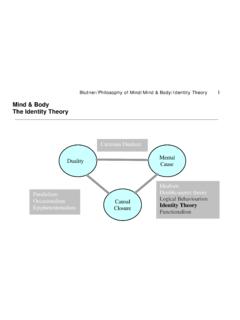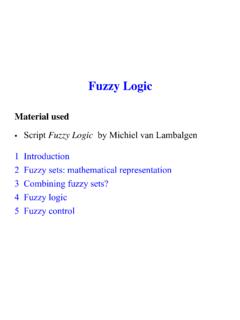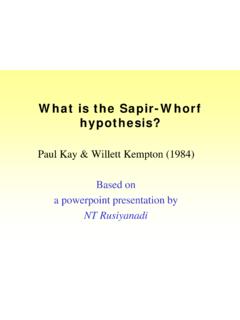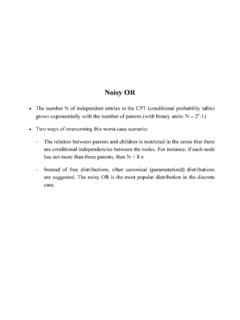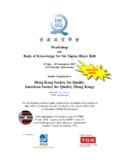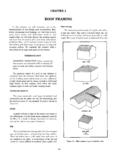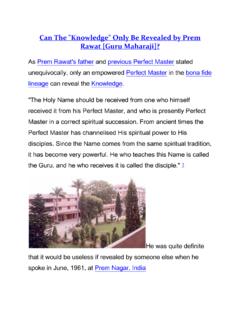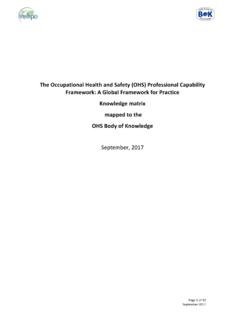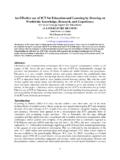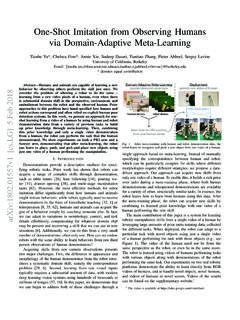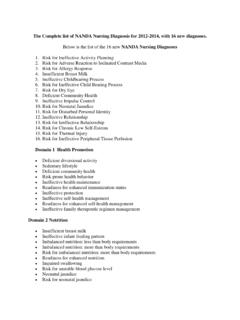Transcription of Mind body dualism - Blutner
1 Blutner /Philosophy of Mind/Mind & body /Cartesian dualism 1 Mind & body Cartesian dualism The great philosophical distinction between mind and body can be traced to the Greeks Ren Descartes (1596-1650), French mathematician, philosopher, and physiologist gave the first systematic account of the mind/ body relationship. He claimed that minds and brains are substances of different kind. Cartesian dualism = dualism of substances Blutner /Philosophy of Mind/Mind & body /Cartesian dualism 2 What are substances in Descartes sense? 1. Individual things* that can exist independently (this excludes shadows) 2. Most substances are complex; they are composed of other substances.
2 3. Substances enter into relationships with other substances (being part, causality) 4. Substances have properties, but they are more than bundles of properties 5. Substances are contrasted with non-substantial concrete individuals like events and with abstract entities like sets and numbers. * Stuff like water, wood is not considered as a substance, following tradition. Blutner /Philosophy of Mind/Mind & body /Cartesian dualism 3 Descartes attribute-mode distinction Instead of properties of substances Descartes speaks of attributes and modes. An attribute is what makes a substance the kind of substance it is A mode can be that can be seen as specifying the attributes possible values.
3 These specifications relate to properties in the ordinary sense. Example: The attribute of a material substance is spatial extension. The particular shape and size possessed by material substances are modes, ways of being extended. Remark: Descartes doesn t consider colour as a mode, instead he considers the texture that reflects light in a particular way as the relevant mode. Blutner /Philosophy of Mind/Mind & body /Cartesian dualism 4 Discriminating material and mental substances Material substance Attribute of spatial extension Modes of extension (form, location, texture, weight) Public* Mental substance Attribute of thought (non-spatial!)
4 Modes of thought (images, emotions, beliefs, desires) Private* * Epistemic properties they concern the character of our knowledge of such things Blutner /Philosophy of Mind/Mind & body /Cartesian dualism 5 Mind and body look very different, but there seems to be a mutual influence The ontological grounding suggests that different attributes are distinctive, hence the exclude each other. Nevertheless, mind and bodies are intimately related The body causally affects the mind (the mind receives signals from your body ) The mind causally affects the body (the body responses to your plans) Minds are distinctive from bodies Blutner /Philosophy of Mind/Mind & body /Cartesian dualism 6 Cartesian dualism fits nicely with common sense dualism makes sense of the apparent bifurcation of mind and body .
5 The qualities of our experience (modes of thought) seems to differ dramatically from the qualities of material bodies (modes of extension) Blutner /Philosophy of Mind/Mind & body /Cartesian dualism 7 Joseph Breuer, Psychologist That the mind causally affects the body was demonstrated by Joseph Breuer in a very famous case, which involved a woman named Anna O. Anna came to Breuer with a multitude of unexplainable symptoms ranging from speech impairment to distorted vision to memory loss. There was no known cause for this sudden onset of physical disturbances that science could explain at the time.
6 As the case went on, it became apparent that Anna had not sufficiently coped with the death of her father. She repressed, and in some cases, suppressed, unwanted feelings into her unconscious that, in turn, caused her physical symptoms. These symptoms disappeared when she began to talk about and discover her hidden feelings. This example supports Descartes theory of interactionism. The mental state that Anna O. experienced led to her physical symptoms. Further, dealing with the repressed feelings resulted in a resolution of her physical symptoms. (From Richard G. Wiltshire) Blutner /Philosophy of Mind/Mind & body /Cartesian dualism 8 Descartes' problem: so different and yet such mutual influence How could an event in an immaterial mind alter a material object?
7 How could a physical event produce a change in an immaterial mind? The metaphysical distance Descartes places between minds and bodies seems to preclude their causally interacting. Fundamental presumption of modern science: Immaterial minds cannot affect the material world. The material world is causally closed. body Mind CAUSE 1 CAUSE 2 Blutner /Philosophy of Mind/Mind & body /Cartesian dualism 9 Descartes causal interactionism Causal interaction between the mind and the body occurs in the pineal gland. Animal spirits , fluids made up of extremely fine particles flowing around the pineal gland, cause it to move in various ways, and these motions of the gland cause conscious states of the mind.
8 Conversely, the mind can cause the gland to move in various ways, affecting the flow of the surrounding animal spirits. This in turn influences the flow of these fluids to different parts of the body . Blutner /Philosophy of Mind/Mind & body /Cartesian dualism 10 The traditional mind- body problem 1. Mental phenomena are non-physical ( dualism ) This is the basic assumption of each kind of dualism . 2. Mental phenomena can affect physical phenomena (Mental Cause) This is the assumption that mental states or events play a causal role. Mental states are effective, for example, when wishes or intentions lead to actions.
9 3. The domain of physical phenomena is causally closed (Causal Closure) This is the basic insights of modern science starting with the development of modern physics in the 17th century. Obviously, the three claims are in conflict. They are logically incompatible! Blutner /Philosophy of Mind/Mind & body /Cartesian dualism 11 The Bieri diagram Cartesian dualism solves this conflict by skipping Causal Closure. Other solutions are possible. We sketch first idealistic solutions and consider then materialist solutions in more detail. Duality Mental Cause Causal Closure Cartesian dualism Blutner /Philosophy of Mind/Mind & body /Cartesian dualism 12 Gottfried Wilhelm von Leibnitz (1646-1716) psycho-physical parallelism According to Leibnitz no coherent sense can be made of Descartes idea that the mind, which isn t even in physical space, can causally interact with a material body (pineal gland).
10 On his view, the mind and the body are in a preestablished harmony, rather like the clocks that were synchronized by the shopkeeper in the morning, with God having started off our minds and bodies in a harmonic relationship. Blutner /Philosophy of Mind/Mind & body /Cartesian dualism 13 Nicolas Malebranche s (1638-1715) occasionalism Malebranche argued that both of Descartes' substances, mind and body , are causally ineffective. God is the one and only true cause. Not only is there no influence of mind on body or of body on mind, there is no causality operative at all except insofar as God, the one true cause, intervenes to produce the regularities that occur in experience.
